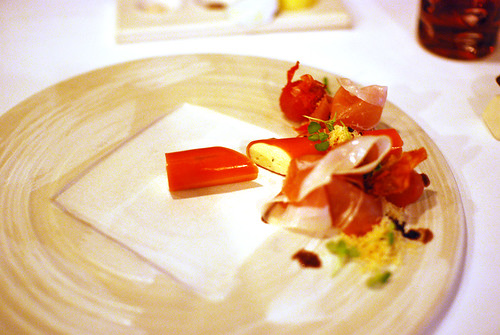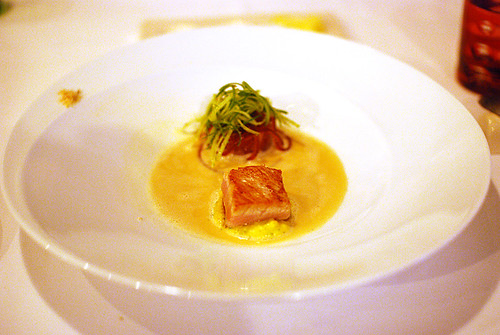Overcommitted.
If you’ve been on Twitter over the past week in Australia, the slightly bewildering hashtag #activatedalmonds has been in ascendency. Pete Evans, chef, reality television judge and corporate spokesperson for Weight Watchers and Sumo Salad was eviscerated 140 characters at a time over a weekend newspaper fluff piece that documented his day of eating:
7am: Two glasses of alkalised water with apple cider vinegar, then a smoothie of alkalised water, organic spirulina, activated almonds, maca, blueberries, stevia, coconut keffir and two organic, free-range eggs.
8.30am: Sprouted millet, sorghum, chia and buckwheat bread with liver pate, avocado, cultured vegetables plus ginger and liquorice root tea.
12.30pm: Fresh fish, sauteed kale and broccoli, spinach and avocado salad, cultured vegies.
3pm: Activated almonds, coconut chips, cacao nibs, plus green tea.
6.30pm: Emu meatballs, sauteed vegetables, cultured vegetables plus a cup of ginger and liquorice root tea.
It’s the sort of empty listicle that a PR rep answers on behalf of the talent by email; a gaily-colored box of text to further brighten the weekend’s non-news. Something a bot might write on your behalf. They’re hardly the most hard-hitting or meme-worthy pieces of newsprint. Collective schadenfreude is Twitter’s raison d’etre and on this occasion, it could taste the slight alkalinity of blood. Why did this article in particular spawn a virulent response?
Search any newspaper website for the word “superfood” and you’ll get a similar bucket of nutritionism snakeoil. Pete alone is not spearheading an unforeseen interest in spirulina or the weird hubris of passing off food as nothing more than a nutrient delivery system.
Evan’s sample menu is aimed at any number of masters: his corporate sponsors, his reality television employers or the subscribers of the Sunday Age. It plays to the obsessions of desperate, rich dieters and smacks of a strange corporate fealty. It’s not the daily diet of a man who eats for the unambiguous pleasure of doing so which is what the public is lead to believe about chefs.
Celebrity chefs are strange advocates for good eating. When commercial imperative clashes with chef’s previous personal tastes and ethics, commerce wins every time. Here’s an ad for a cheap pilsener starring Ferran Adria. Here’s organic chicken aficionado Jamie Oliver making industrial chicken sandwiches for fun and profit. Pete’s transgressions aren’t noteworthy alongside his international counterparts.
There is something about the deep commitment to his routine that is unnerving. He didn’t crack at 3:00pm and eat a pastry from the catering table. No midnight drive-thru at KFC, eating powdered mash and gravy one-handed on the drive home, crying into the empty “Family” sized bucket on the couch. This was the first image that came into my head when I thought of Pete Evans’ diet. I barely know who the man is and expected the worst.
When we see the growing “backlash” against foodies, it seems to be against this deep commitment. I hate the term “foodie” because it has no real definition and seems to encapsulate any particular interest in food from haute cuisine to ethical eating. You can as easily be labelled a foodie if you can comfortably follow a cupcake recipe or you’ve taken a decade to write the world’s definitive history of cupcakes. There’s no shortage of nuanced nouns to pigeonhole people who eat. But foodie backlash it is, not gourmet backlash or glutton backlash; an all-encompassing counterattack on the commitment to food.
Instagramming your meal to death.
Steve Cumper, Australia’s best food blogging chef, recently noted the new zealotry for “real food”, the modern hipness for home-growing everything and being the person who shoots, skins (and photographs) the rabbit pre-terrine.
This real food is apparently unencumbered by status, it is home grown, it is foraged, its is hunted, it is gleaned, it is not, as Lance Armstrong put it, about the bike, or in this case, not about the Kodak moment.
This is honest, unprocessed, un-wanky, un-restauranty, un-gather your photographer mates around you to capture the ad hoc picnic in the dis-used cannery on the wharf kinda food. This is the kinda food that doesn’t need embellishments, is SO un-gourmet, shrugs off pretensions and artifice and reveals itself to a few hip but grounded uber-cools who operate high in the coolosphere where the air, I’m told, is crisper.
The trouble is: Why are people like me hearing about it all the time?
I feel smug when I publish what I grow in my garden, mostly because growing up outside the city, planting a vegetable garden was unremarkable and the least noteworthy of domestic pursuits. Hopping the back fence with a .22 to shoot dinner was just something that I thought most kids did even if it wasn’t the case. It didn’t seem to mark any deep commitment to food because it was common amongst neighbours.
And the Internet didn’t exist.
The backlash isn’t so much about the commitment but the conspicuousness of people’s commitment to food whether it is Pete Evan’s voluntary deprivation or hearing about real food all the time from Facebook updates and blow-by-blow degustations captured on Instagram. When I hear that people want out of Facebook, I wonder how boring their collected acquaintances are and I’m certain what they had for dinner is a large part of it. Where previous backlashes against foodies was more about the excesses of gourmets, it is now all-encompassing because our friends don’t know when to stop; to leave the unremarkable experiences unremarked and save the best for conversation.




